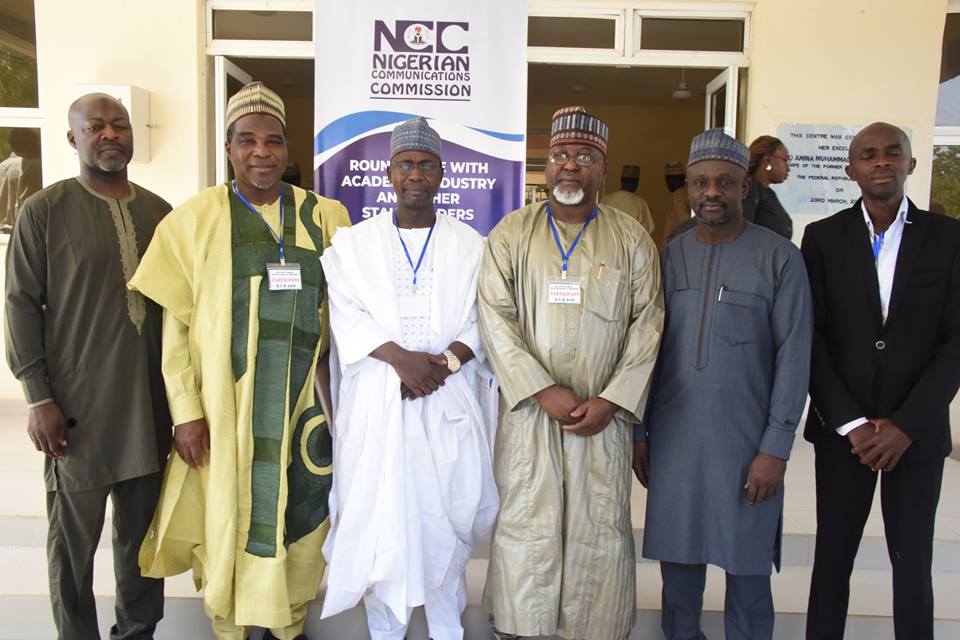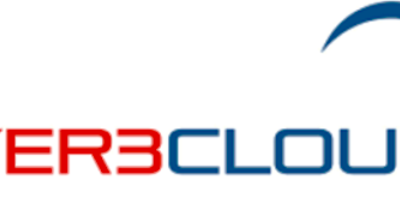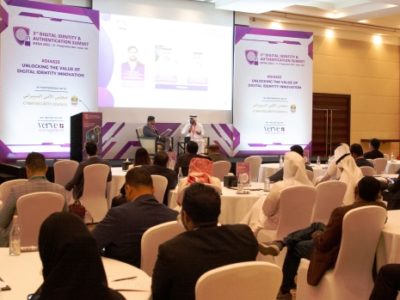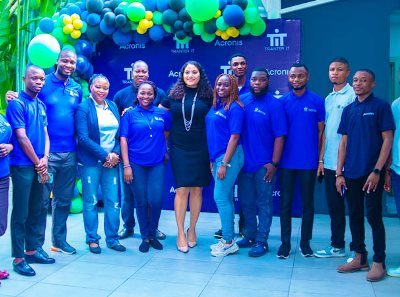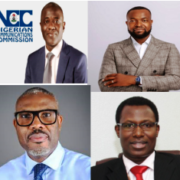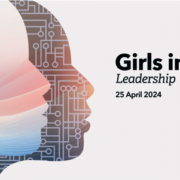By Marozoka Oruame
The Nigerian Communications Commission (NCC) is charged with the responsibility of regulating the supply of telecommunications services and facilities, promoting competition, and setting performance standards for telephone services in Nigeria.
Since inception, the telecom regulator has taken some enormous strides allowing it to positively impact on developments in the telecommunication industry beyond its primary role as “the independent National Regulatory Authority for the telecommunications industry in Nigeria.”
RELATED
NCC Presents 2018 Research Grants To Nigerian Scholars
Danbatta, NCC And Search For Nigeria’s Zuckerbergs
NCC Endows N40m Professorial Chairs In Two More Varsities
Over the years, it has earned a reputation as the foremost telecom regulatory agency in Africa, not just for its dynamic regulatory approach to trends in the industry but also for a portfolio of interventions or initiatives helping to foster use of ICT for different aspects of national development.
Some of these initiatives include the State Accelerated Broadband Initiative (SABI) and Wire Nigeria project (WIN) to help stimulate demand and increase the uptake of ICT tools and services necessary for enthronement of a knowledge society in Nigeria.
The telecom regulator has extensively delved into many areas of development to expand digital access to Nigerians, build capacity and also fund research efforts focusing on telecommunications as they may impact on people (community) and the environment.
Through several of these initiatives, the commission has championed Corporate Social Responsibilities (CSR) an organisation’s sense of responsibility towards the community and environment.
Funding telecoms-based researches and innovations
The commission consistently funds telecoms-based researches and innovations as landmark projects to deepen the value proposition of the telecoms industry and broaden digital developments within communities.
In 2014, the NCC invited research proposals from tertiary institutions in the country to promote telecoms-based innovations from the academia as a critical aspect of its mandate. It would then present a grant of N2.5 million to the lead researcher from the Covenant University on “Implementation of a Software-Based Nomadic Base Station (NBS).” The thrust of the research is to help in locally achieving an NBS ‘capable of boosting the capacity of contiguous cell sites to cope with unplanned traffic surge at places of big events and high telecommunication usage.’
The research focuses on a key area of need within the telecommunications sector in terms of quality of service and the capacity of telecommunication infrastructures to withstand sudden or unplanned heavy traffic.
The commission has since fostered a tradition of supporting ICT Research & Development Innovations in all its Strategic Management Plan.
“The NCC has an inclination of supporting research. I have the passion for research and development. Over the years the commission has supported intellectual work by providing support through various intervention projects in tertiary institutions across the country,” said Executive Vice-Chairman of NCC, Professor Umar Garba Danbatta, at a recent public function in Abuja where he re-asserted that the commission will sustain its support for research in tertiary institutions and secondary schools across the country.
The commission yearly request for Proposal on Telecommunications Based Research Innovation from Academic in Nigerian Tertiary Institutions. Last year and in spite of the COVID-19 pandemic, the NCC awarded the 2020 Research Grants (Telecommunications-based Research Innovations from Academics in Nigerian Tertiary Institutions programme) to the tune of Fifty Four Million Seven Hundred and Five Thousand, Six Hundred and Thirty Two Naira, Fourteen Kobo (₦54,705,632.14) to the five tertiary institutions that were adjudged to have best responded to the request for proposals published in national dailies and on the commission’s website and social media handles on Thursday July 3, 2020.
The 2020 awardees research focus include: 5G Deployment in Nigeria; IOT Low Power Wide Area Network; Monitoring and Localization of Drones; Advanced method of Quality of Service (QoS) Quality of Experienced Management and Test Mechanism; and Innovative Clean Energy Technology.
Closing the gaps between gown and town
Danbatta believes it is crucial for the NCC to continue to support the academic community as a way to close the gaps between gown and town. In Bridging the Gap Between the Academia and Industry – NCC Collaborations with the Academia, one of his research works, the NCC’s boss, an academic and researcher himself, submits:
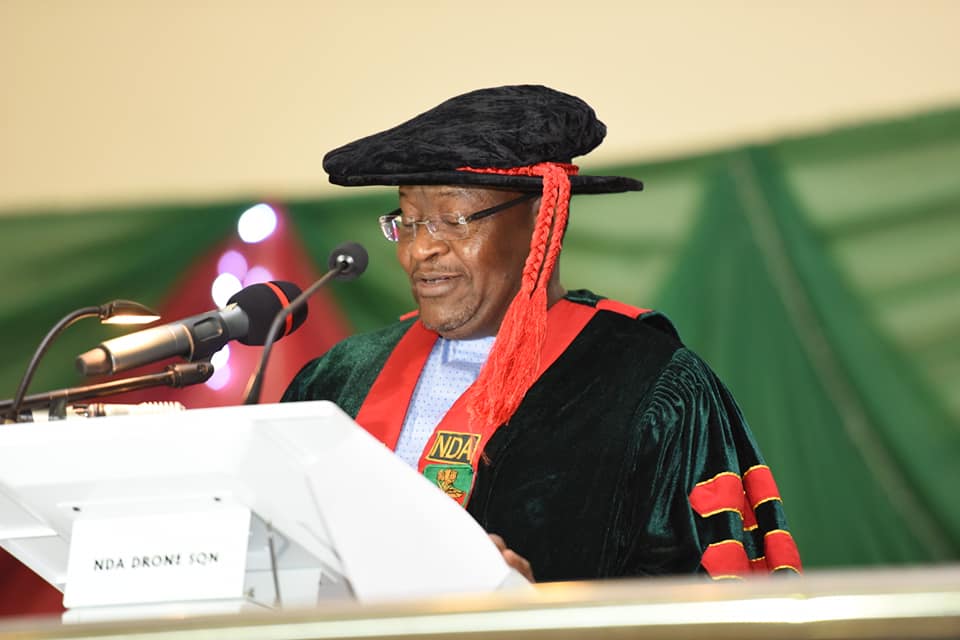

“Effective collaboration between the academia and industry would help mitigate the encumbrance of investment in the academia through improvising the needed sustainable resources, which will ease the Academia reliance on Government funding. As a matter of necessity, the academia should encourage multi-disciplinary researches/projects in order to attract proprietary research investors.
“Furthermore, there is the need for them to develop a cohesive vision framework and strategies (plans) that addresses collaboration barriers, which in the long run will attract various Industries.
“The NCC has collaborated with the Nigerian academia in the field of Infrastructure, Research and Development (R&D), and Capacity Development as part of our Corporate Social Responsibilities (CSR). The effective sequences of NCC CSR are assisting in bridging the divide between the academia and industry.”
NCC: Promoting Digital Awareness Programmes
Another significant area of concern for the NCC is creating awareness programmes, the NCC is really keen on educating and enlightening the community in different aspects of telecommunications including the positives and the negatives. This the why the commission introduced the Advanced Digital Awareness Programme for Tertiary Institutions (ADAPTI) and Digital Access Programme (DAP) for secondary schools.
ADAPTI is one of the programmes the commission introduced to bridge the digital divide existing in the academia. “Since its introduction in 2008, more than 300 institutions of higher learning have been beneficiaries of the programme.” ADAPTI is implemented by the provision of computers and other state-of-the-art e-learning facilities within the academia.
The chief beneficiaries of ADAPTI are students, lecturers and other experts with the academic community. They are all given the opportunity to acquire or improve their ICT skills and also have access to numerous online windows for research and learning – Wireless cloud exists within the ADAPTI framework, comprising of laptops with wireless internet facilities. Over 297 institutions of higher learning have so far benefitted from the ADAPTI programme since it was first launched in 2008.
The DAP is designed to bridge the digital divide existing in secondary schools. Under DAP, the commission provides classrooms that are fully equipped with computers and other ICT facilities, including a generator and internet connection to enable the schools and its immediate environment to have access to the internet.
“At the last count, the DAP Project supports 229 Secondary Schools around the six (6) Geopolitical Zones of Nigeria, including the Federal Capital Territory.”
DAP has particularly been helpful in schools by allowing students to carry out their online examination activities such as subscription to Joint Admissions and Matriculation Board (JAMB); West African Examinations Council/ School Examination (SE) and National Examination Council (NECO/ School Examination (SE) among other examinations.
Over 217 schools around the country have benefitted from DAP. It is the goal of the NCC to take this programme to as many schools as possible within all geo-political zones. Noteworthy, DAP is designed not only to assist students and schools. It is built to provide digital access and empowerment to surrounding communities within which DAP-adopted schools are located.
Aside from this the NCC regularly organizes sensitization campaigns to educate and enlighten people on different telecommunications issues, a clear example of this is a sensitization campaign organized by the NCC in form of a visit to secondary schools in Abuja and Lagos earlier this year to educate students on safer internet practices and the dangers of cyber-bullying.
Image: NCC (NCC holds Roundtable Interaction with Academia, Industry and other Stakeholders in Kano)


